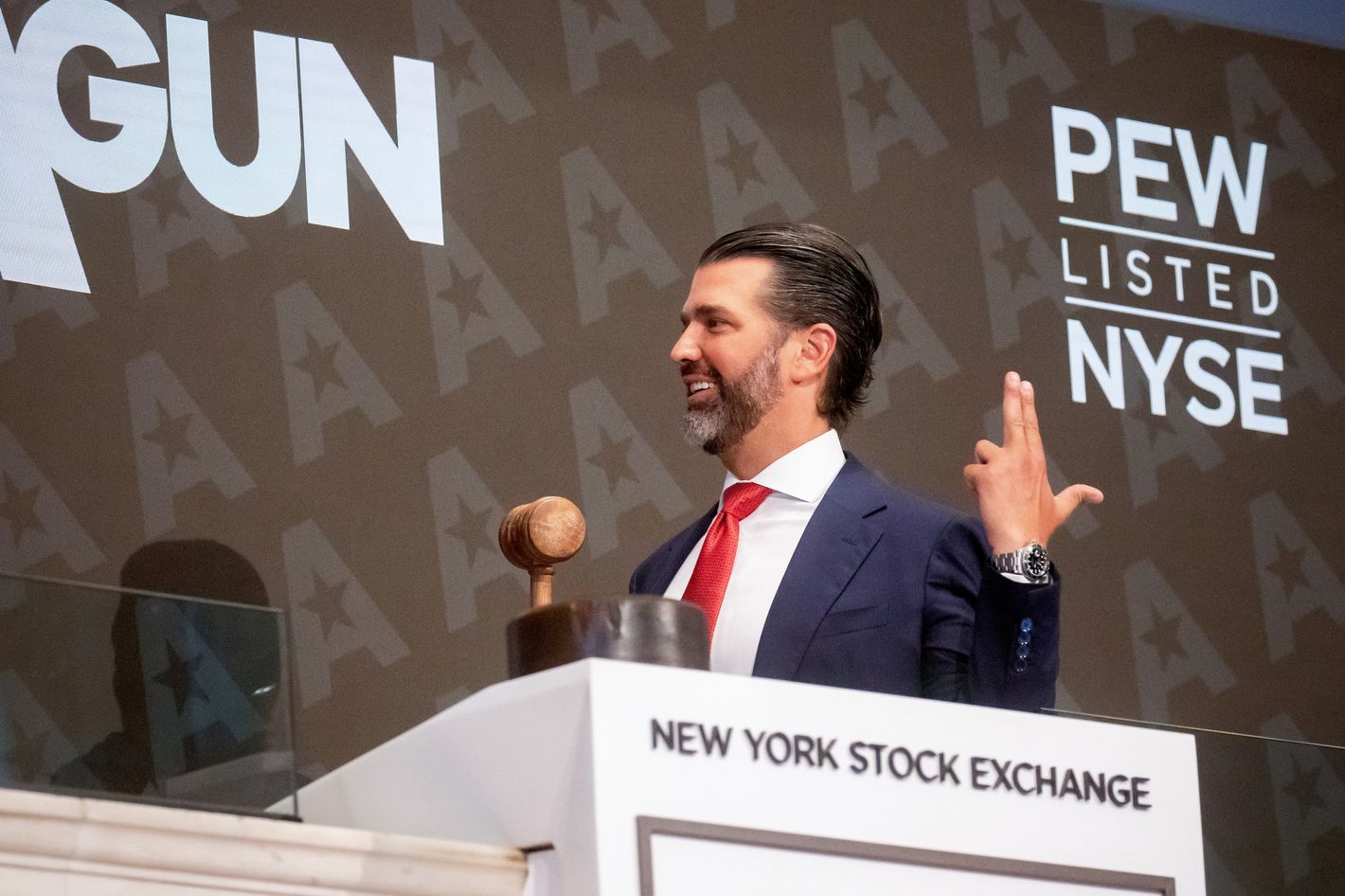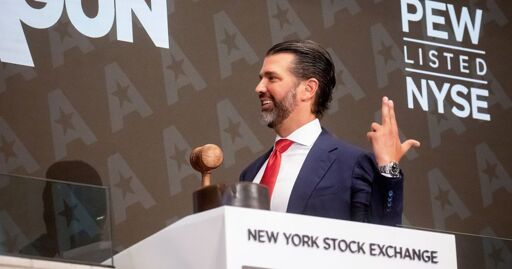 Photo: Michael Nagle/Bloomberg/Getty Images
Photo: Michael Nagle/Bloomberg/Getty Images
It’s an extremely lucrative time to be Donald Trump Jr.
Since Election Day last November, he has been on a make-money rampage with the Trump Organization, licensing deals for a luxury hotel in Dubai; a massive business center in India; a residential tower in Saudi Arabia; a golf-course resort on the Gulf of Oman; and, just a quick Gulfstream flight away, a golf course and villa complex in Qatar.
He’s become an adviser or board member to a multitude of companies, including the drone manufacturer Unusual Machines, the prediction market Kalshi, and Dominari, a wealth-management company that once invested in cancer therapies but now mostly just buys bitcoin. He put $4 million in a company called ThumzUp, which used to do social media but now, also, mostly just buys bitcoin. And with his brother Eric, Trump Jr. launched Trump Mobile, a new cell service with $499 Trump-branded gold phones (which were originally marketed as being made in America, an assertion was quickly walked back).
On July 16, Trump Jr. was making money once again, this time in the heart of Wall Street with his new girlfriend, the Palm Beach socialite Bettina Anderson, on his arm. The occasion was the initial public offering of yet another investment: an online firearms marketplace called GrabAGun.
The day of the IPO was a hot one, with temperatures in the high 80s before noon. Trump Jr. was dressed in a blue suit with a red tie, and Anderson was wearing a red cropped skirt suit, black pumps, and dark sunglasses. Trump Jr.’s partner in the venture, Omeed Malik, had commuted in from his summer place in the Hamptons for the occasion.
Trump Jr. has pitched GrabAGun as an anxiety-free way to arm oneself, marketing it to anyone who might feel awkward in a gun store. “Your experience of going to your local gun shop, it may be fine for me, it’s, ‘Hey, Don, how’s it going,’” he told Bloomberg TV. “If you’re a female, if you’re someone that’s young, that’s an uncomfortable experience in many cases.” With GrabAGun, the customer pays online for their preferred firearm — a MAGA-branded assault rifle, maybe, or a $110 shotgun — and it ships to a nearby gun store, which conducts a federally approved background check before the customer picks it up. In other words, it’s Carvana but for weapons.
Outside the stock exchange, a giant American flag and a GrabAGun banner stretched proudly across the building’s iconic Corinthian columns. A man in khakis walked past the suits on line, trying to catch someone’s eye as he heckled, “School shootings today? School shootings? Great.”
Inside the building, a buffet station offered cookies decorated with the GrabAGun logo on the fondant as waiters circled the room with breakfast tacos notable for their size (about that of a thumb) and choice of tortilla (hard-shell). Listening in on various conversations, a consensus emerged: The market was really good, mayoral front-runner Zohran Mamdani was really bad, and the weather was really hot.
Before he was partnered with Trump Jr., Malik, a Jersey-born son of Pakistani and Iranian immigrants, was a Democratic donor and a star at Bank of America a decade ago, reaching the executive level before 40. But in 2018, he was pushed out of BofA following allegations that he “made unwanted advances toward female colleagues and engaged in relationships with female subordinates,” as The Wall Street Journal reported. Malik denied wrongdoing, filed a defamation suit, and reportedly received a settlement in the eight figures. Since the pandemic, he has rebranded as an investor in proudly right-wing companies — a business sector he calls the “parallel economy” — through his firm 1789 Capital, a private-equity company based in Palm Beach, Florida, just two miles from Mar-a-Lago. Five days after his dad became the president, Trump Jr. announced he was joining 1789 as a partner.
Since then, Trump Jr. and Malik have co-founded a conservative social club in Washington, D.C. (with a $500,000 membership fee), and invested in a Peter Thiel–backed company that is attempting to launch an athletic competition company like the Olympics, but the athletes are on performance-enhancing drugs. “A lot of companies know about us and want to make sure that they do business with us,” Malik said of the perks of Trump Jr.’s involvement in 1789. “So that helps us a lot.” (Malik is also benefitting from Trump’s presidency more directly: In April, he was given a position on the Fannie Mae board.)
GrabAGun was set to go public this particular July morning via a SPAC — a financial tool used to enter the stock market without the full confidence needed for a traditional IPO or the associated safeguards for investors. Trump Jr., Malik, and GrabAGun CEO Marc Nemati were welcomed to a small stage, where Trump Jr. said the company was a way to “really ensure the freedoms” owed to all Americans by the Bill of Rights.
In premarket trading, the value of GrabAGun shot up to $21 a share — over 100 percent higher than the $10 per share that the SPAC expected the stock to trade at. Before the market opened, Malik encouraged the crowd to get rowdy. Then Trump Jr. rang the opening bell, and supporters chanted “USA.” Trump Jr. and his friends posed for photos making gun hands. At 9:30 a.m., the stock debuted for public trading as PEW — as in the sound a child might make when pretending to play with a gun.
Seconds later, PEW began to fall, dropping 15 percent in its first five minutes as a public company. Still, Trump Jr. & Co. remained in good spirits, going outside to take photos in front of the American flag blanketing the Stock Exchange. Secret Service agents shooed tourists away from Trump Jr. and his team, who continued to chant “USA” as the stock tumbled further.
When I spoke with Malik later that afternoon, after the market had closed, PEW was down 38 percent — a dip that didn’t seem to hurt his confidence. “I gave them $179 million and made them a household name,” he said of GrabAGun. Plus, the stock had closed $3 higher than the $10-per-share target. “Obviously, we want it to trade higher as the company proves itself,” he said, while noting that what happens after the stock went public was not his responsibility.
Retail investors who bought the hype may be losing out: Eight days later, PEW was trading at $7.31 per share — about a third of the price in the moments before the launch. But Trump Jr. and Malik will almost certainly still profit. In exchange for promoting the company, serving on its board, and filling out the homework for going public, they received a number of shares that they will be able to sell in six months. Trump Jr. will get about one percent of all shares, worth about $4 million as of closing on launch day. Plus, GrabAGun intends to combine two of his favorite things; Jr. proudly stated that the gun site will soon accept cryptocurrency as payment.
On Reddit, the best place to gripe if you lose money on the stock market, some investors are complaining that “$PEW really screwed us over” while hoping that President Trump might bail them out with a friendly tweet to lift the stock. Trump Jr., meanwhile, is focused on his next venture, telling Bloomberg that he is looking into taking another “canceled” company public in exchange for a hefty number of its shares. After all, why let a little thing like losing other people’s money get in the way of making his own?
From Intelligencer - Daily News, Politics, Business, and Tech via this RSS feed

